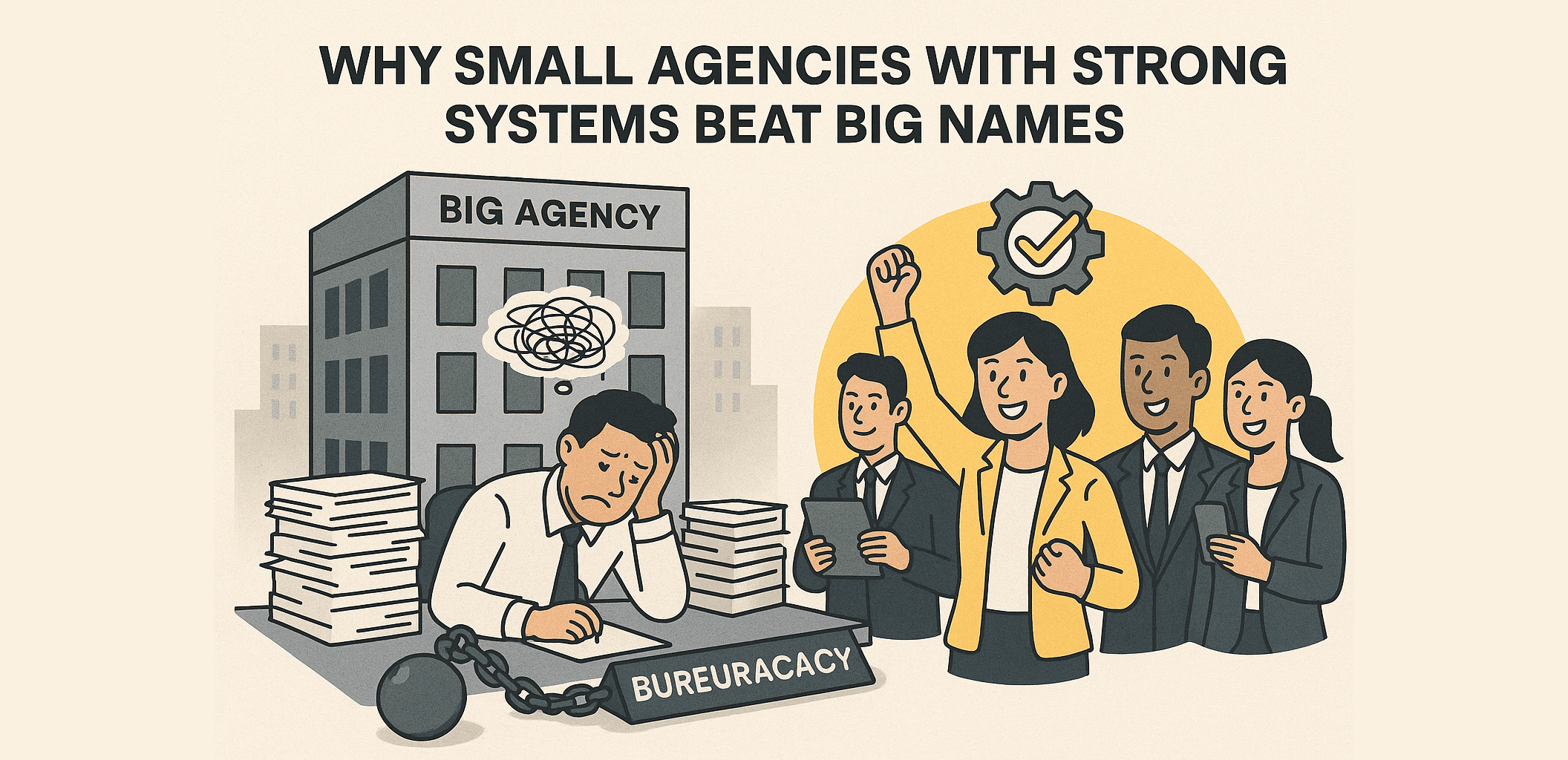Why Small Agencies With Strong Systems Beat Big Names

In real estate, size is often mistaken for strength. Big-name agencies boast hundreds of agents, giant offices, and brand recognition. Smaller firms often feel they’re at a disadvantage.
But in today’s market, small agencies with strong systems often outperform the giants. Agility, flexibility, and smart tech adoption give them hidden advantages that scale alone can’t match.
1. Agility Beats Bureaucracy
Large firms move slowly. Decisions get bogged down in hierarchy, approvals, and red tape. Small agencies, on the other hand, can pivot quickly:
- Adopting new tech without months of committee meetings.
- Adjusting commission structures to attract talent.
- Experimenting with marketing strategies in days, not quarters.
In a fast-moving market, agility isn’t just an advantage—it’s survival.
2. Flexibility Agents Actually Feel
Big agencies often sell prestige, but that prestige comes with rigidity: fixed splits, long reporting chains, and one-size-fits-all policies.
Small agencies can offer what top producers really want:
- Flexible commission models.
- Personalized support from leaders.
- Freedom to build a personal brand without fighting corporate rules.
This flexibility translates directly into agent loyalty.
3. When Size Becomes Fragility
A large agency may look unshakable, but its very size creates fragility.
Take commission schemes as an example. In many large setups, middle management thrives on overriding structures. If a boss tries to impose a high-payout scheme to attract talent, middle managers resist because it eats into their overrides.
Push too hard, and those managers leave—taking their downlines with them. In extreme cases, an established brand can collapse overnight, not because the market turned against it, but because its structure couldn’t handle change.
Smaller agencies don’t face this resistance. Without layers of override politics, they can roll out bold payout schemes, restructure incentives, or pivot business models without fear of implosion.
4. The Branding Illusion
Big agencies sell prestige. But here’s the reality: buyers don’t care about agency branding.
They care about:
- The property itself.
- The negotiator’s service and responsiveness.
- The deal they’re able to secure.
An agency’s logo doesn’t close deals—agents do. This means small firms, armed with strong systems and quality negotiators, can stand toe-to-toe with the so-called “big names.” In many cases, they actually outshine them.
5. Tech as the Great Equalizer
A decade ago, small firms couldn’t compete with the infrastructure of big names. Today, technology has leveled the field.
With the right systems, even a boutique agency can:
- Manage leads and listings seamlessly.
- Track commissions transparently.
- Collaborate through structured platforms instead of chaotic WhatsApp groups.
Tools like ListingMine ERP and Groups give small firms enterprise-grade capability without enterprise-level costs—turning size into a non-issue.
6. Culture Scales Better in Small Teams
Big firms often suffer from diluted culture—thousands of agents, many inactive, and little sense of belonging. Smaller agencies can build tight-knit, high-trust teams where:
- Leaders know their agents personally.
- Mentorship is real, not motivational fluff.
- Collaboration trumps politics.
Culture drives performance—and it thrives better in smaller, structured teams.
The Hard Truth
Big names sell prestige, but prestige doesn’t close deals.
👉 In today’s competitive market, small agencies with strong systems are not just surviving—they’re quietly beating the giants. Their agility, freedom from override politics, and tech leverage give them the edge.
With tools like ListingMine, a 30-agent firm can operate with the power and transparency of a 300-agent brand — without the bureaucracy, bloat, or structural fragility.
Because in real estate, the future isn’t about who’s biggest. It’s about who’s best structured.











































































































